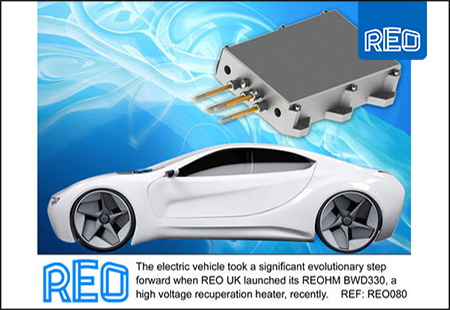Innovation in electric vehicles charges ahead
The electric vehicle took a significant evolutionary step forward when REO UK launched its REOHM BWD330, a high voltage recuperation heater, recently. The D330 brings significant efficiency improvements to the vehicle thermal management systems used in electric vehicles. Its launch comes at a time when the market for clean energy vehicles continues to expand amidst supportive legislation and improving infrastructure.
Forming an integral part of the vehicle thermal management system, the D330 reduces energy consumption and offers increased cooling efficiency during emergency braking.
In conventional fuel engines, any waste heat generated is usually reused to heat the cabin. However, until now electric vehicles have had to use electrical energy for heating both the cabin and the batteries during winter. This has the detrimental effect of diminishing battery life, increasing the running cost and detracting from the potential maximum range. The key barrier to the adoption of electric vehicles has been battery life and range.
The BWD330 minimises this dependency on the battery by using the energy generated from the act of braking, which is stored and reused for heating as and when required. Lower energy consumption means that carbon emission targets can be met.
“Electric vehicle manufacturers can also realise significant savings with the BWD330, because 66% less installation space is required compared to standard units,” explained Steve Hughes, managing director of REO. “We’ve also reduced volume by 85% and weight by 76%. All of this results in a unit which weighs less than 10kg with a rating of 420-450V DC and a maximum braking power rating of 60kW.
“Despite making such drastic improvements, we’ve maintained high levels of safety. In the event of drive system failure, the BWD330 can discharge the DC link, which will dissipate unwanted power safely.”
News of the D330 comes as recent high profile breakthroughs in the industry pave the way for wider consumer adoption of clean energy vehicles worldwide. The state of California passed a ‘charge ahead’ bill in February, which seeks to combat the currently high levels of pollution by introducing one million electric vehicles by 2020. Similarly, the Government of Bhutan signed a deal with Nissan recently, to supply the mountainous country with electric vehicles as part of its zero emissions targets.












